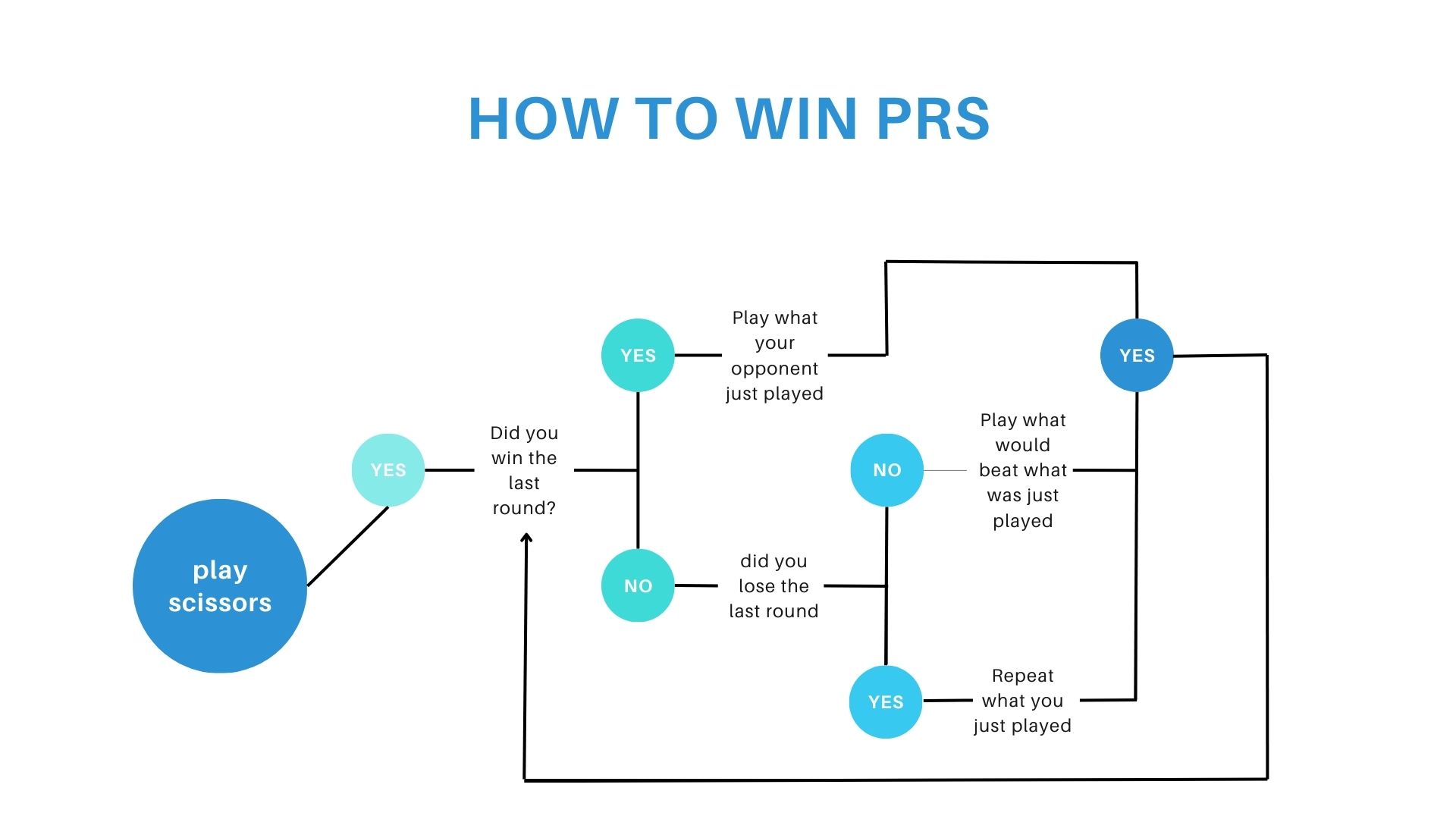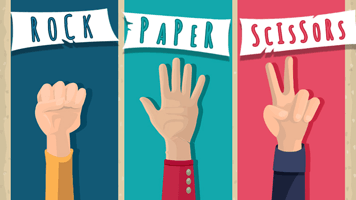Rock, Paper, Scissors
Grade 7
Presentation
Hypothesis
Our research question is: are there patterns when people play rock paper scissors? Is it possible to learn how to always win rock paper scissors?
We think that on average on someone's first match of paper rock scissors (PRS) they will play rock. We think this because we have experienced it and it is also very comfortable for the hand. We also think that when in a match, if someone loses they have a higher chance of changing their hand gesture because they feel like with the same hand gesture they will lose again. We think that if someone wins they will play the same hand gesture. We believe that people can learn how to improve their skills of playing PRS.
Research
During one experiment of PRS researchers found that out of 90 people 22.2% of people started with rock, 40% started with paper and 37.7% started with scissors (Zhang et al., 2021). In another experiment researchers found that overall 31.8% played rock, 34.8% played paper and 33.3% played scissors (Eyler et al., 2009). Many experiments also look at when people win, lose and tie if they downgrade, upgrade or stay the same. When looking at upgrading and downgrading some scientists found that when someone upgrades they are more likely to upgrade again. They also found that when someone downgraded, they were likely to downgrade again (Dyson et al 2016).

Variables
Independent variable: How/when the three different hand gestures of PRS are used in a game of rock paper scissors
Dependent variable: data of PRS games of 2-3 matches
Controlled variable: the 3 same hand gestures being used and the people playing the PRS game
Procedure
1) First we got permission from teachers, students and parents to get participate in the experiment.
2) Then we observed 6 people playing 3 rounds of rock paper scissors game and record into data table
3) Look at the data and make it into charts and graphs
4) We used our data to make a rough draft of how to "win" rock paper scissors
5) Then we researched strategies that scientists have found on how to win PRS to help us make a better and more accurate method of how to "win" PRS
6) Now knowing how to win PRS we went back to the same people from the first observations. But this time we gave one of two people in each group that lost the last round of observations the cheat sheet we made and a bit of inside information to see if the cheat sheet is accurate in a game of rock paper scissors
Observations
For the first rounds of PRS when no one had cheat sheets we observed that people overall played scissors and paper more than rock (18 people played scissors, 18 people played paper and only 15 people played rock). During the first half of observations we also found that during the first match that people played scissors 27.8%, paper 38.9% and 33.3% rock. For the second round of observations when half of the people had cheat sheets we observed that people who had the cheat sheet tied 22.2%, won 44.4% and lost 33.3% of the time. We also noticed during the second half of our observation experiments 66.7 % of people got better and 33.3% stayed the same (2 got better and 1 stayed the same).










Analysis
We found that there is a pattern for how everyone plays PRS because everyone plays in a certain way, which leads us to think they have their own ways to play. We also found that they did not usually play rock first and they also played scissors and paper more, which we think was because they think their opponents will play rock first so therefore they play one of the other hand gestures. We also believe they don't play rock because they think their opponent will think they are playing rock. We found that scissors and paper were both played 18 times during the first observations, while rock was played 15 times. This helps prove our point that people play rock less because they think it's more obvious. We also found that when someone lost that they downgraded more often, when they won half of them upgraded and when they tied they did each hand gesture the same amount of times.
Conclusion
Through this experiment we have observed patterns of how our volunteers played PRS and how they chose their hand gestures (rock, paper and scissors). We now know that if we have a PRS tournament for who has to do the chores, there is a pattern that we can use to increase our odds of winning.
Application
PRS is a game of chance (but it is slowly changing to less of a chance game due to science). So things like if you have to do chores and have to play PRS to decide then it could help and if there is some threat involving winning PRS but also just for fun. If you're terrible at it then here's a strategy.
Sources Of Error
- People messing up instructions or not listening to instructions
- Not having correct or reliable sources
- If someone who was not supposed to see the cheat sheet saw it and used it to win
- If people chose different strategies for PRS from day one and day two of observations
- People searching up how to win PRS in between first and second set of observations
- People not having any strategies and just playing random things during PRS
Citations
Bright Side. (2022). The Only 100% Winning Strategy for Rock, Paper, Scissors. YouTube https://www.youtube.com/watch?v=JXtwfy9cHFk
Dyson, B. J., Wilbiks, J. M. P., Sandhu, R., Papanicolaou, G., & Lintag, J. (2016). Negative outcomes evoke cyclic irrational decisions in rock, paper, scissors. Scientific reports, 6, 20479
Eyler, D., Shalla, Z., Doumaux, A., & McDevitt, T. (2009). Winning at rock- paper-scissors. The College Mathematics Journal, 40(2), 125–128.
Matthews, R. (2017) Chancing it: The Laws of Chance and How They Can Work for You. Skyhorse Publishing
Zhang, H., Morrison, F., Gonzalez, C. (2021). Paper-Rock-Scissors: an exploration of the dynamics of players’ strategies. Proceedings of the Human Factors and Ergonomics Society Annual Meeting, 64(1). https://www.cmu.edu/dietrich/sds/ddmlab/papers/ZhangMoisanGonzalez2020.pdf
Acknowledgement
We would like to acknowledge our parents for organizing research dates. We would also like to acknowledge our teacher, Mrs MacDonald for letting us use her room for our experiment and guiding us through how to do it and lastly we would like to acknowledge the participants that did the experiment that we observed to help us understand PRS.

